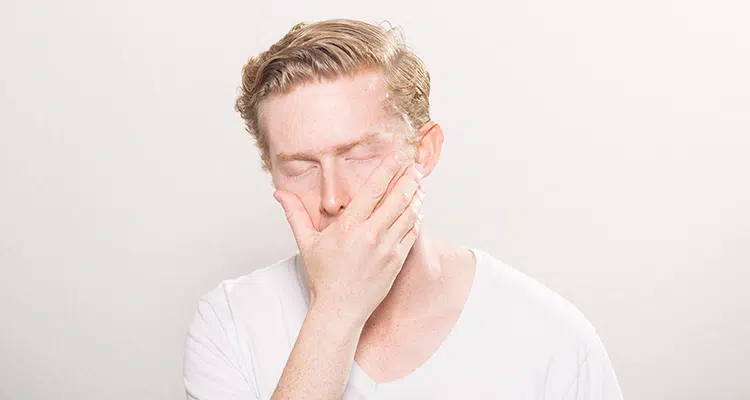Everything You Need to Know About Cyclobenzaprine (Flexeril) for Sleep
Cyclobenzaprine, formerly sold under the name Flexeril, is a cost-effective generic alternative to traditional muscle relaxers used to treat muscle pain and discomfort. This prescription drug is designed to ease pain and discomfort associated with tight or sore muscles, acute pain, and discomfort caused by muscle spasms. It’s also known to cause drowsiness and improve sleep in those with chronic pain.

Although cyclobenzaprine can make it easier to fall asleep by relieving the pain that’s keeping you up at night, is it a suitable replacement for traditional sleep aids and medications? Can you use this muscle relaxer to ease insomnia symptoms?
In this article, we’ll address all these questions and more so you can make an informed decision about how and when to take cyclobenzaprine for pain or to improve sleep quality.
Content
What is Cyclobenzaprine and How Does It Work?
Cyclobenzaprine is a muscle relaxer used to treat muscle spasms and acute muscle pain. It’s not intended for long-term use or to treat chronic pain. Cyclobenzaprine and muscle relaxers like it are usually prescribed following an injury, car accident, or another minor incident that causes muscle spasms and other temporary muscle conditions.

Doctors recommend patients stop taking this drug after 2 to 3 weeks to prevent dependency. For patients with chronic pain or severe injuries, a different muscle relaxer may work better. Combined with rest and physical therapy, cyclobenzaprine works to relieve pain and discomfort associated with sprains, strains, and spasms.
Cyclobenzaprine is considered a skeletal muscle relaxant because of the way it affects the body’s nervous system. Once the drug enters your body, it triggers your brain and nervous system to relax different muscles in the body, simultaneously relieving the pain and discomfort you feel. Muscle relaxers such as these act like a depressant for your body’s central nervous system. This causes a sedative effect and prevents your nerves from sending pain signals to your brain. In turn, cyclobenzaprine can also make you sleepy.
Cyclobenzaprine also reduces hyperactivity within the body as it interacts with the alpha motor systems and the gamma system. Both systems contain nerve fibers that connect directly with different skeletal muscles in the body and are responsible for muscle contraction. Unlike other muscle relaxers that work through the spinal cord, cyclobenzaprine works directly through the brain stem.
Dosage and Usage
Cyclobenzaprine comes in both short-acting tablets and long-acting capsules. Your doctor may prescribe you 5 mg, 7.5 mg, or 10 mg depending on the reason, your medical history, and other factors like age, weight, and gender.

The short-acting tablets are made for patients 15 years of age or older. The dosage ranges from 5 mg to 10 mg and it’s suggested you take it 3 times a day, as needed. As of this writing, cyclobenzaprine isn’t FDA-approved for children younger than 15. The long-acting capsules are recommended for patients 18 years of age and older and come in 15 mg doses. These are taken only once a day. Some patients may require two doses equaling 30 mg at one time or two 15 mg doses twice a day. Long-acting capsules are not recommended for anyone under the age of 18.
Patients can take cyclobenzaprine with or without food but should always follow the doctor’s instructions carefully. If you miss a dose, try to take it as soon as you remember unless it’s almost time for your next dose. In this case, skip the missed dose and follow your normal dosing schedule. It’s not recommended that you ever take a double dose of cyclobenzaprine unless directed by your doctor. It’s also not recommended that you take this muscle relaxer for more than 3 weeks.
Most patients taking the short-acting cyclobenzaprine tablets report feeling the effects within 20 to 30 minutes and lasting for four to six hours. The long-lasting capsules take slightly longer to take effect but you may feel relief for up to 24 hours. In most cases, it could take up to 37 hours for your body to fully eliminate the drug.
If you’re taking cyclobenzaprine as a sleep aid, the short-acting tablets may work best. For starters, they take effect almost immediately, helping you fall and stay asleep. Secondly, the effects start to dissipate after six hours. This is long enough for you to get a relatively good night’s sleep without worry over feeling groggy or disorientated in the morning. It’s important to note, however, that this muscle relaxer isn’t intended for use as a sleep aid. It can, however, reduce acute pain or discomfort that’s causing your insomnia and offer short-term relief for acute insomnia.
Things to Consider Before Taking Cyclobenzaprine
Drug interactions and side effects are always possible when taking a muscle relaxer or any other prescription drug. For that reason, you should consider a few risk factors before taking cyclobenzaprine, whether it’s for muscle pain and discomfort or to facilitate better sleep habits in the short term.

Allergic Reactions and Drug Interactions
Before taking cyclobenzaprine it’s important to tell your doctor all of the medications you’re currently taking or if you have a history of allergic reactions to any of the ingredients contained in the drug. Some medications that may negatively interact with cyclobenzaprine include:
- MAO inhibitors
- Certain nutritional supplements and herbal products
- Certain allergy and cough and cold medications
- Certain sleep pills and sedatives
- Some selective serotonin reuptake inhibitors (SSRIs)
- Some medications used to treat depression, anxiety, and other mood disorders
It’s important to share a complete list of medications and allergies with your doctor before taking any new medicines, including cyclobenzaprine. You shouldn’t combine this muscle relaxer with another sleep aid or alcohol. Because cyclobenzaprine also causes drowsiness, it can intensify the effects of alcohol and other sleeping pills, causing dangerous side effects. You should avoid operating machinery or driving a vehicle when taking this medication.
Health Concerns
Tell your doctor if you’re dealing with other medical conditions or health concerns in addition to muscle pain and insomnia. An overactive thyroid, heart disease, heart failure, or a recent heart attack could all increase your risk of experiencing serious side effects when taking cyclobenzaprine.
People with glaucoma, increased eye pressure, liver disease, and difficulty urinating may not react well to this particular muscle relaxer. Women who are pregnant, trying to get pregnant, or breastfeeding shouldn’t take cyclobenzaprine. Individuals over the age of 65 should consider alternative options to cyclobenzaprine. Studies show that there are other safer, more effective drugs for treating muscle pain and insomnia in older patients.
Potential Side Effects
Every medication has potential side effects and cyclobenzaprine is no different. Although some people benefit from the drowsiness caused by this muscle relaxer, there are other potential side effects to consider. These include:
- Nausea
- Dry mouth
- Dizziness
- Heartburn
- Constipation
- Extreme tiredness

While these symptoms are fairly common and not dangerous, other more serious side effects are also possible and may require immediate medical attention. These include:
- Swelling of the face or tongue
- Chest pain
- Irregular or fast heartbeat
- Hives or a skin rash
- Difficult swallowing or breathing
If you think you may have taken too much cyclobenzaprine and are at risk of an overdose, you may exhibit the following symptoms and need to call 911 immediately.
- Tremors
- Loss of consciousness
- Trouble speaking or moving
- Hallucinations
- Confusion or extreme agitation
- Vomiting
Pros and Cons of Cyclobenzaprine
If you’re considering cyclobenzaprine as a muscle relaxer or a way to help ease short-term insomnia, you have to look at both the pros and cons. While all medications have potential risks and side effects, you need to determine if the pros outweigh the cons. Here is a list of both.

Pros
- It doesn’t cause extreme muscle weakness as some other muscle relaxers do
- Works quickly
- Cyclobenzaprine tablets are cheaper than other alternatives
- Safe to use for those individuals with kidney issues
- Can be taken on an “as needed” basis and still deliver effective results
- Works well to treat muscle spasms and pain associated with specific musculoskeletal conditions
- Works to improve range of motion, tenderness, pain, and your ability to perform day-to-day activities
- Can improve sleep quality and make it easier to fall and stay asleep despite uncomfortable and painful muscle spasms
- Relieves pain and skeletal muscle spasms without impacting muscle function
- Provides long-lasting results
Cons
- Isn’t the safest option for patients over the age of 65
- Could cause extreme fatigue and dizziness
- Interacts with most antidepressants
- Doesn’t work for muscle spasms caused by spinal or brain injuries
- Isn’t safe for those with heart problems or thyroid issues
- Sedation is a major side effect that can impair your ability to perform daily tasks
- Users are at higher risk of experiencing seizures, heart attacks, and heart palpitations
- Some side effects are similar to those seen in patients taking TCAs (tricyclic antidepressants)
- Abruptly stopping cyclobenzaprine could result in headaches, sickness, and excessive fatigue although these are not indicative of an addiction to the drug
- Cyclobenzaprine is only intended for short-term use (2 to 3 weeks)
- Can not treat muscle spasms caused by spinal cord diseases or cerebral palsy
- Combing cyclobenzaprine and MAO inhibitors could be fatal
FAQs About Cyclobenzaprine
Do you still have questions about whether or not cyclobenzaprine is the right muscle relaxer for you? Here are some of the most frequently asked questions to help guide your decision.

Is Cyclobenzaprine a Painkiller?
No. Cyclobenzaprine is a muscle relaxer, not a pain killer. While it can help reduce and relieve muscle spasms that may cause pain or discomfort, it doesn’t work like a painkiller. It also doesn’t treat or ease nerve pain or pain associated with inflammation.
Does Cyclobenzaprine Help with Anxiety?
Cyclobenzaprine is not approved or recommended for treating anxiety but it does cause some of the same side effects as other anti-anxiety medications including sleepiness and drowsiness.
Tips for Managing Pain and Improving Sleep Quality
There are countless underlying health conditions, external factors, and lifestyle choices that can cause or worsen insomnia symptoms. If pain is making it difficult for you to fall and stay asleep, you may want to consider pain medication or a muscle relaxer like cyclobenzaprine to help ease your discomfort and finally achieve the quality sleep you need.

Here are a few more tips for improving sleep quality despite acute or chronic pain.
Exercise Daily
Physical activity can not only improve sleep but also keep your muscles strong and flexible. This may prevent future injuries. If you’re currently recovering from an injury and undergoing physical therapy, check with your therapist before adopting a new exercise routine. A daily walk or other low-impact exercises can work wonders for your physical and mental health.
Try exercising first thing in the morning. Not only will this provide an energy boost but it can also improve your mood and make it easier to fall asleep at night. If possible, get outdoors during your workout. Studies show that increased exposure to natural light can also improve sleep.
Find New Ways to Relax
Extreme stress can cause increased muscle tension and worsen your current pain or discomfort. Finding new ways to destress and relax can help ease muscle strain while also reducing anxiety and improving your mental health. The less stressed you are, the more relaxed you become and the easier you may find it to fall asleep at night. Meditation and mindfulness are two great ways to destress, slow down racing thoughts, and reduce anxiety while also relieving muscle tension – especially in the neck, back, and shoulders. It’s also easy to incorporate into your daily schedule. Meditate for 5 to 10 minutes each morning, before going to bed, or both. Journaling at night can also help purge anxious thoughts and better prepare you for sleep.
Invest in Quality Bedding
Quality bedding including a firm mattress, supportive pillows, and breathable sheets can not only help you fall and stay asleep but may ease symptoms associated with muscle spasms and pain. Invest in a mattress that is a good balance of firm and soft. The pillow you choose should support your neck without putting pressure on your spine. Placing a pillow between your knees can also help with spinal alignment. Breathable sheets help keep you cool at night and prevent night sweats.
Adopt Healthy Lifestyle Choices and Sleep Habits
Achieving better sleep is directly related to your overall mental and physical health. If you’re facing acute pain or recovering from a recent injury, chances are, your sleep quality has been compromised. While medications like cyclobenzaprine can help, adopting healthy sleep habits and making minor changes to your daily routine can ease both pain and insomnia symptoms.

Somnus Therapy’s online sleep therapy program can help guide you toward the best approach for treating both acute and chronic insomnia, regardless of the cause. Click here to get started.
















